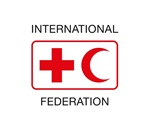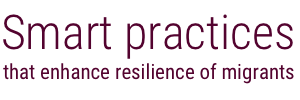Cards are loaded with credit and used to purchase food from accredited vendors.
WFP and the Turkish Red Crescent Society provide migrants with KIZILAYKART food cards with credit to purchase essential food and NFIs from accredited vendors both in camps and in host communities. The programme allows migrants to diversify their diets based on their own priorities shaped by their local or cultural preferences. It also prevents food waste, and allows migrants to socialize in markets and have control over their budgets.
Each month the project uploads to KIZILAYKARTs 50 Turkish lira (17 US dollars) for expenditure in camps and 62 Turkish lira (21 US dollars) for expenditure in urban areas for every person living in a Syrian household. Cards are provided through Halk Bank. The amount uploaded can only be used for purchasing approved supplies through point of sale machines earmarked to contracted suppliers. This permits oversight and monitoring to ensure that sufficient quantities of various nutritious and fresh food products are available for purchase by households at competitive market prices. Items such as alcohol, tobacco, chocolate, sweets, biscuits, ice-cream and soda cannot be bought or sold through the cards. Turkish Red Crescent Society and WFP teams perform periodic market audits. If they note abuse – either on the price or quality of products – they issue a report, which can cause the termination of the contract with the stores in question.
Ninety per cent of interviewed beneficiaries said that the cards were better aligned to traditional preferences than hot meal distribution. KIZILAYKARTs allow access to varied, nutritious food which migrants can purchase when and how they wish.
WFP and the Turkish Red Crescent Society together distributed KIZILAYKARTs to over 268,000 refugees across Turkey between 2012 and May 2016.
Design. [P1] Focuses on ensuring the most vulnerable migrants have access to food. [P3] Increases migrants’ agency by allowing them to select what to eat.
Implementation. Partnership between Turkish Red Crescent Society and WFP.
Programme. [P9] Responds to displacement.
- Future funding streams for the program are unclear.
- The possibility of tensions with vulnerable Turkish populations who might also feel entitled to a similar programme.
- KIZILAYKARTs act as a pull factor because they are provided only on one side of the country.
Smart practices
Smart practices report and database survey
About the report
People migrate in pursuit of a better life for themselves and their families. As described in the International Federation of Red Cross and Red Crescent Societies’ (IFRC) Policy on Migration, “migrants are persons who leave or flee their habitual residence to go to new places – usually abroad – to seek opportunities or safer and better prospects.
Read more
About the International Federation

